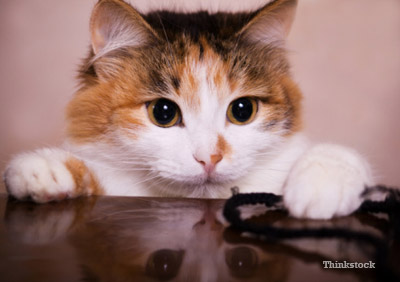
Unlike some dogs, cats do not drool a great deal, and in fact, it sometimes goes unnoticed (unless we scratch their chins or find a small damp spot where they have been lying down).
There are a number of reasons why your cat might drool, and they tend to fall into three major categories:
- Pathologic conditions that result in inflammation, pain or an inability to swallow.
- Irritations that the cat is trying to “wash away”
- Emotional stimuli
Most drooling is intermittent and only involves a small amount of saliva. If your cat is drooling excessively it is a good time to have her examined by your veterinarian. Some of these causes can be very serious, and early detection is always best.
1. Dental disease and cat drool
There are some conditions, like dental disease, that produce irritation of the mouth. In those cases drooling is an effort to remove or sooth the irritation in the mouth or throat. Dental disease is a common cause of excess drooling. As many as 85% of cats over 3 years of age have tooth or gum disease. The saliva that results may be blood tinged or smell unpleasant.
Check out, "10 Reasons Why You Should Take Care of Your Pet's Teeth."
2. Respiratory conditions and cat drool
Some cats that develop viral respiratory conditions develop ulcerations in their mouth, resulting in increased saliva flow.
3. Oral cancer and cat drool
Although much less common than dental or viral inflammation, some cats do develop oral cancers that can occur anywhere from the tip of the tongue to the back of the throat. These conditions result in excessive and ongoing drooling. This is an indication that your cat should have a complete examination from your veterinarian with particular emphasis on oral conditions.
4. Foreign bodies and cat drool
Less frequently, excessive drooling may be due to a foreign body. Cats may swallow a blade of grass, a sewing needle or a small fish bone and this object can become lodged in the mouth or esophagus. They may paw at their mouth or try to vomit but the bottom line is swallowing is uncomfortable and the cat will not swallow normally.
5. Fear and cat drool
Some cats drool when they are very excited, upset or fearful. Nausea and the apprehension that precedes vomiting often result in drooling. Motion sickness may be a result of driving in a car or apprehension. In either event, it generally stops at the end of the ride. If your cat drools out of apprehension it will not persist.
6. Joy and cat drool
Some cats may drool when they are extremely relaxed and enjoying being petted or cuddled. This is not uncommon and merely indicates a physiologic response to happiness. Similarly some cats may drool when they are asleep, probably because they are so relaxed. Think of it like that small wet spot you find on your pillow after a sound sleep. This type of drooling is often an indication of a happy cat.
If you have any questions or concerns, you should always visit or call your veterinarian – they are your best resource to ensure the health and well-being of your pets.
